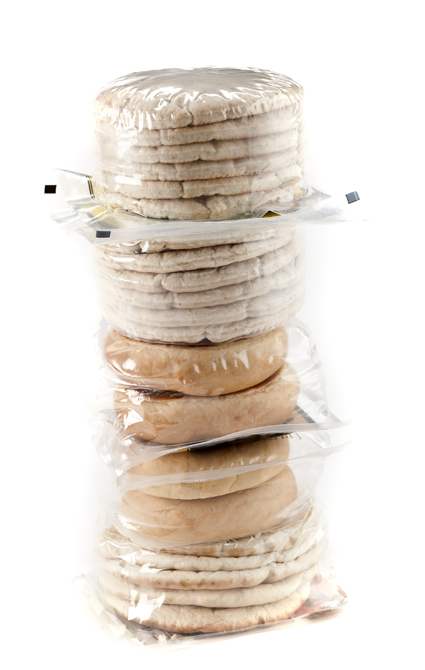Modified Atmosphere Packaging of Bread Products

Bread products are excellent candidates for modified atmosphere packaging (MAP) and the technology is used widely for such foodstuffs. Typical products that benefit from MAP are tortilla wraps, baguette, bagels, pita, naan bread and other types of bread. Because these products have a relatively low water content, the type of microbes that can cause spoilage are mainly moulds, as bacteria prefer more water. These moulds are aerobic – they need oxygen from the air for their growth. So excluding oxygen and using a high proportion of carbon dioxide – up to 100% – is a highly effective way of significantly increasing the shelf life of these bread products. A big advantage of using very high CO2 as the modified atmosphere is that it makes the packaging relatively easy to test for leaks. Leak detection systems for carbon dioxide are well developed and can be configured to work automatically during the packaging process.

The integrity of the packaging materials is especially important for bread products, as any leakage can cause oxygen to enter which could rapidly result in the growth of mould, and also cause the product to dry out and become stale.
Typically a pre-baked bread product packaged in an atmosphere exclusively of carbon dioxide would see an increase in shelf life from around five days to 20 days when stored at room temperature. Some products can retain a shelf life of up to six months if packaged in an appropriate atmosphere and with correct packaging materials. Packaging bread products in this way means that the products do not need to be frozen, which makes it easier and cheaper for them to be stored, transported and distributed.
Other bakery products are amenable to MAP, although there are other considerations. For products that have icing, for example, too much carbon dioxide can cause the appearance to deteriorate. In such cases a certain amount of nitrogen in the mixture solves the problem.
The integrity of the packaging materials is especially important for bread products, as any leakage can cause oxygen to enter which could rapidly result in the growth of mould, and also cause the product to dry out and become stale.
Typically a pre-baked bread product packaged in an atmosphere exclusively of carbon dioxide would see an increase in shelf life from around five days to 20 days when stored at room temperature. Some products can retain a shelf life of up to six months if packaged in an appropriate atmosphere and with correct packaging materials. Packaging bread products in this way means that the products do not need to be frozen, which makes it easier and cheaper for them to be stored, transported and distributed.
Other bakery products are amenable to MAP, although there are other considerations. For products that have icing, for example, too much carbon dioxide can cause the appearance to deteriorate. In such cases a certain amount of nitrogen in the mixture solves the problem.




